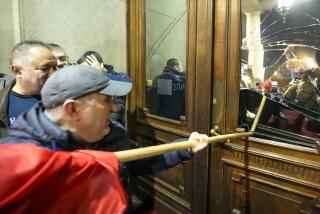Serbian militants attack border posts in Kosovo
PRISTINA, KOSOVO — Well-organized Serbian gangs torched buildings Tuesday along the border between Serbia and Kosovo in a defiant rejection of the breakaway province’s declaration of independence.
Huge flames and walls of black smoke engulfed border posts and United Nations police and customs offices in the most serious violence to date over Kosovo’s unilateral split from Serbia, declared Sunday by the ethnic Albanian government.
U.N. police, who have helped administer Kosovo for nine years, were forced to flee, and NATO troops rushed to the area to restore order.
The Serbian militants appeared to be enforcing their own partition of northern Kosovo -- where many Serbs live -- from the rest of the Albanian-dominated province.
Although Serbian Prime Minister Vojislav Kostunica called Monday for Serbs to show restraint, his government Tuesday seemed to encourage the groups wreaking havoc along the frontier.
Slobodan Samardzic, Serbia’s minister for Kosovo, said the central government was not behind the gangs’ vandalism. But he said Serbia intended to take over customs functions in northern Kosovo.
“Today’s action is in accordance with general policy of the government to take over customs policy wherever it can in Kosovo, as well as all other policies, all other responsibilities. That is simply a process that is not going to be stopped,” Samardzic told B92 television in Belgrade, the Serbian capital.
“We saved the face. We saved a part of Kosovo,” Samardzic said. “Serbia will never recognize the independence of Kosovo.”
He denied that Serbia was attempting to slice off northern Kosovo. But he said, “We preserved a part of Kosovo.” He said recognizing an independent Kosovo was “total madness.”
The U.S. and many European countries have recognized the new country, but Russia, Serbia and others said Kosovo’s revolt was illegal.
Kosovo Prime Minister Hashim Thaci, asked about Tuesday’s violence, said Kosovo Albanians would not be provoked.
“Everything is under the control of the NATO authorities, Kosovo police and the United Nations, and no isolated incident will undermine Kosovo’s independence celebrations,” he said at a news conference with Javier Solana, the European Union’s foreign policy chief.
Solana arrived to offer support. The EU will take over from the U.N. in the next four months as supervisor of Kosovo’s fledgling institutions. The U.N. has governed Kosovo since 1999, when North Atlantic Treaty Organization bombing halted Serbian attacks on ethnic Albanian separatists.
Serbs, who are mainly Orthodox Christians, have retained control of parts of northern Kosovo, including the half of the tense town of Mitrovica north of the Ibar River. Serb officials have suggested that they intend to partition their section of Kosovo if the world recognizes an independent Kosovo ruled by mostly Muslim ethnic Albanians, who make up a majority in the area.
Several newspapers and magazines in Serbia received e-mails from a group calling itself Mlada Bosna, or Young Bosnia, claiming responsibility for a string of hand-grenade attacks since Kosovo’s independence declaration.
The group’s name echoes that of the organization that included Gavrilo Princip, who in 1914 killed Austro-Hungarian Archduke Franz Ferdinand, triggering World War I.
--
Special correspondent Zoran Cirjakovic in Belgrade contributed to this report.
More to Read
Sign up for Essential California
The most important California stories and recommendations in your inbox every morning.
You may occasionally receive promotional content from the Los Angeles Times.











